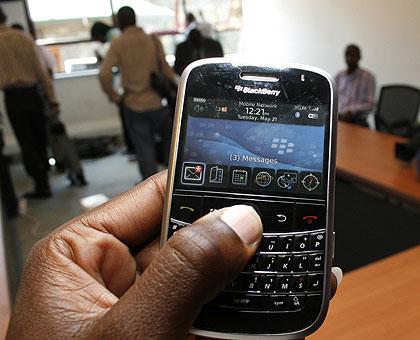Rwanda Utilities Regulatory Agency, RURA, has announced plans to undertake a probe into persistent failures of the MTN-Rwanda Cell network, with a view to minimising the cost to subscribers.


Rwanda Utilities Regulatory Agency, RURA, has announced plans to undertake a probe into persistent failures of the MTN-Rwanda Cell network, with a view to minimising the cost to subscribers.Director General of RURA, Regis Gatarayiha, told The New Times that the move comes after complaints were raised from mobile phone users about the pitiable services from telecom companies. The network breakdown is akin to that witnessed by MTN in 2007, when it enjoyed a virtual monopoly in the local telecom sector.RURA, the telecoms regulator, then fined MTN over Rwf70 million for poor services dominated by network failures and dropped calls. "We are investigating the issue and the magnitude of inconveniences caused so as to devise a way forward,” Gatarayiha, said on Friday.Subscribers argue that MTN’s mobile and internet services are choking communication, with slow internet, dropped calls and complete network failure on their handsets. "I am tired with MTN internet, I can’t get a good Internet signal in my house!” Cyril Ndegeya, a resident of Muhima in Kigali told The New Times.Last month, the Prime Minister, Pierre Damien Habumuremyi, during a visit to MTN head offices in Nyarutarama, Kigali, also voiced his concern, saying many people, including foreigners visiting the country, have complained about the network failures.Recognising the magnitude of the problem, MTN CEO Khaled Mikkawi admitted faults in their network after a series of repeated explanations to their subscribers.Julie Vulpius from Denmark noted that it is becoming a big problem for the society to have unstable communication infrastructure with the current network breakdown.Last week, Yvonne Makolo, Chief Marketing Officer, MTN Rwanda explained that MTN, as a growing telecom operator, has to expand its infrastructure to serve the increasing number of subscribers better, hence the reason for the current challenges. "In order to cater for our increasing subscriber base and provide improved quality, MTN increased third Generation-3G coverage by over 30 percent."This means we have a number of new 3G sites and we have been carrying out an optimisation exercise,’ she told The New Times. MTN uses both 2G and 3G.The 3G is a platform that offers faster mobile internet speed compared to 2G and provides standards for reliability. Recently, telecoms were urged to migrate from 2G to 3G to meet the International Mobile telecommunications-IMT-2000 standards.According to telecom experts, poor quality service is perhaps a result of transmission problems, overload on the computer Central Processing Unit- CPU as a result of many people subscribing for the network or the telecoms poor planning and, too little swap over link between switches among other issues.Nevertheless, Gatariya noted that despite promises from the telecoms migrating to 3G, they still do not provide what they had promised. Subsequently, the regulator has installed a new system that will measure bandwidth to ensure that subscribers get what they pay for.MTN, which has the leading market share, boasts of over 2.9 million subscribers, while Tigo has over 1.5 million subscribers. In total, over 4.4 million people use mobile phones, indicating a 41.3 percent penetration as per November 2011, according to RURA statistics.But industry observers note that the company’s rush to upgrade maybe related to the anticipated launch of Airtel next month. Airtel, which plans to roll out the 4G platform, poses a threat to its would-be rivals, MTN and Tigo, who are still struggling with 3G.But Makolo noted that the upgrading is the company’s obligation to give its clients better service. "Upgrading, maintaining and improving our network are on-going processes regardless of impending competition,” she insisted.


